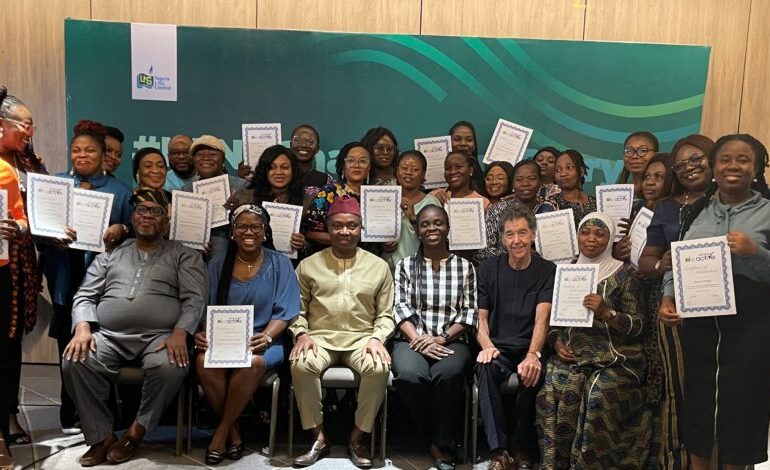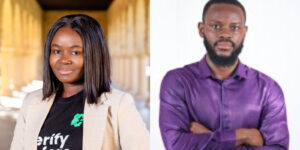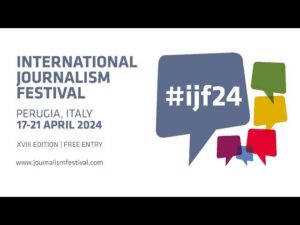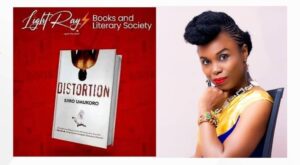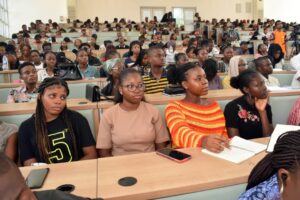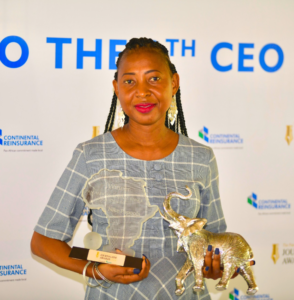Female journalists who participated in the capacity-building workshop, themed Gender Active, sponsored by Nigeria LNG Limited (NLNG) in Lagos have shared insights and lessons they gained during the training.
The programme held from 30th January to 1st February 2024 according to Yemi Adeyemi, NLNG’s Acting Manager, Corporate Communications and Public Affairs, is another edition in the series of #NLNGChangeYourStory workshops focused on arming women journalists with cutting-edge digital communication and social media skills for reporting gender-based issues.
Mr. Andy Odeh, NLNG’s General Manager, External Relations and Sustainable Development, in his remark during the workshop, emphasised that the focus on gender-related journalism aligns with NLNG’s commitment to Diversity, Equality, and Inclusiveness, both within and outside the organisation.
Aisha Ibrahim, National Chairperson of the National Association of Women Journalists (NAWOJ), who was represented by the association’s National Deputy Chairperson, Lilian Okonkwo-Ogabu, stated that women journalists need to be positioned for the future in reporting the realities of women and children, especially the girl-child, in Nigeria.
She commended NLNG for supporting the women with digital communication skills that will bring them to par with contemporaries around the world.
The workshop was facilitated by seasoned journalist, Mr. Dan Mason in collaboration with The Journalism Clinic, led by Mr Taiwo Obe.
Below are the responses of some of the participants;
Chinyere Elizabeth, The Nation
I learnt about telling stories with mobile phones which involves creating engaging narratives optimized for mobile devices with different Apps such as Cap Cut and Canva. The take away is to be concise with my storytelling because mobile users have short attention spans. I’m to focus on being concise and tell impactful stories that will capture mobile users interest quickly.
Another important take away was how to design a story to fit various screen sizes that will give a seamless experience across different mobile devices. Visual appeal matters, so using visually appealing elements like images, videos, and infographics to enhance a story and make it more engaging for mobile users is key.
I also learnt that optimizing loading speed is important to Mobile users for fast-loading content. So we are to optimize our storytelling for quick loading times to ensure a smooth and enjoyable experience for mobile users.
Mosunmola Ogi-Olu, Arise News.
The training was centered on how to use Mobile friendly devices, i.e digital tools to tell stories. Most especially stories that project women the way they should be projected. We were told to be gender sensitive when writing out stories. For example, there are both men and women in many professionals, Instead of referring to women in such profession as Spokesman, Chairman, Work man etc. Why not refer to them as Spokesperson, Chair, Worker.
We learnt on how to use some mobile friendly apps like Capcut and Canva for podcast, news report, for designing infographs when writing a story that involves data, for creating maps, among others.
Since the media landscape is changing, so are the audiences. The younger generations often referred to as the GenZ’s are slowly losing interest in the traditional media. With this in mind , it’s critical for journalists to leverage on social media, where these people are, thereby writing or producing stories that would make the audience obsessed.
It’s important for journalists to tap into the growing desire for social media, learn how it works in order to write or produce stories that will carry everyone along.
Ijeoma Thomas-Odia, The Guardian Newspapers
At the Gender Active Training organised by NLNG and The Journalism Clinic, Mr. T. O at the beginning stressed that by the end of the session, we will never be the same. And true to his words, that is my case.
Before now, I would see beautifully arranged posts on social media which is mostly done by influencers and I didn’t think this skill is something I would ever get for free and even with tools to kick start.
Mr. Dan Mason is an amazing teacher. He started out with Capcut and unraveled the mystery behind this app that a lot of us never knew existed.
With Capcut, I can tell my story in different shades; either with images laced with voice notes (can even be AI generated); with words prepared in Canva (another amazing app) and then export to Capcut where you can then add other clips to suit your purpose.
You can also be in the clip by speaking about a certain concern and add photos (with auto generated caption) all done in Capcut.
We were taught to use ChatGpt, Bard, Infuse Maps, use graphs (bar, pie, mixed, and more) if need be in our dissemination of news.
This way, it is interesting and when a new item is published it would attract viewership because of itself style of presentation.
Most importantly, we were taught to present stories in question format, what way people are more inquisitive to know.
On the Gender side of the training, we were taught to amplify women related stories, present them in an equitable manner.
Women related stories and human right stories, hence there should be gender sensitivity in our reporting. Men and women should be placed on pedestals that are equitable and both voices be amplified.
In all, the training has equipped me with modern day editing skills needed to drive digital journalism. I am poised to tell my stories better!
Onozure Dania The Punch Newspaper
.Some of the topics that were covered at the training were story forms, like using quotes to tell stories, pictures, selfie-style of telling stories, voice-over style of telling stories, and audiograms.
Another topic that was also covered was using images to tell stories. I learned to use CapCut video editing App with background remover plus AI text to image. I was also taught how to use Canva, for telling Image stories, charts, and maps. How to use Canva to design photos and videos.
I would say that the Gender active training on how to use digital communication to tell stories was very impactful. At least it made me know that staying ahead of the game is essential in today’s rapidly evolving digital media landscape. These days real-time information and effective digital communication an indispensable tools.
The training allowed me to unlearn, relearn, and sharpen my digital communication skills and carve a niche in this modern era, for myself. Though I’m still trying to master what I have been taught, at the training, I would say it was an eye opener because over the years I have just been using my phones to only receive calls, return calls, send WhatsApp messages, and email, but I didn’t know that I could use my phone to tell stories.
I also learned that I should keep my story short and simple, but it should have all the information that I’m trying to push out. Basically the training was worth it, and I’m grateful to NLNG, Journalism Clinic, and Dan Mason, for the opportunity to learn new ways of telling stories. And essentially telling stories about women so that women’s voices can also be heard.
Bunmi Aduloju, TheCable
At the 3-day training we were taught how to use multimedia tools to tell creative stories.
Additionally, we were trained on a variety of topics, including reporting errors about females that go unnoticed in Nigerian media, which also opened our eyes to the much bigger global problem.
Personally, what sticks with me is the practical digital skills I learned, such as how to use video editing tool CapCut and graphic designing tool Canva in the most effective ways.
As a print journalist, l learned that I could incorporate creative measures to ensure my stories gain wider reach, ensuring my audiences are captured on social media.
I had attended several trainings about multimedia tools, but for me, the difference was in the hands-on, instructional training provided by Dan Mason, trainer at the Journalism Clinic.
In particular, we were given mobile phones and selfie sticks to help facilitate the training, and as such, I am both empowered and equipped to play my part in achieving gender equity in the country.
